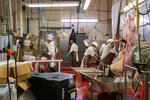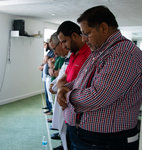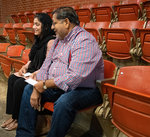



SILER CITY — Abdul Chaudhry likes to take care of his people.
He’ll tell you as much on a walk-through of his Siler City business, Chaudhry Halal Meats, pointing to the several relatives he employs or the ways he looks to support his employees and their children in pursuing educational opportunities.
“I’ll do anything for them,” Chaudhry said.
For Chaudhry, lifting up those around him has been a constant and conscious effort for the meat wholesaler — both inside and outside the slaughterhouse on Stockyard Road.
Much of Chaudhry Halal Meats’ business is rooted in servicing independent, local farmers in Chatham County. And whether it’s establishing one of the first halal meat slaughterhouses in North Carolina — providing a much-needed service to Muslims across the Triangle — or founding and financing the construction of the only mosque in Siler City, Chaudhry knows what it means to carve out space for himself and the people he cares about.
Now, as he rings in the 26th year of his business and a career in meat processing that stretches even longer, Chaudhry is seeing the fruits of his labor and preparing the next generation of butchers in his family.
Chaudhry Halal Meats, which processes goat, lamb and beef, was formally established in 1996. But its foundation was more than a decade in the making, stemming from a gap Chaudhry sought to fill in his community.
In 1979, a 19-year-old Chaudhry immigrated from Lahore, Pakistan, to Siler City. His uncle had earlier moved to the U.S. on a labor certification in the early 1970s, and shortly after, Chaudhry’s father immigrated as well, along with Chaudhry and his brothers and sisters.
The family spent one night in New Jersey, Chaudhry recalls, before traveling the next day to Randolph County in North Carolina, where his uncle had bought a farm.
In those days, Chaudhry said his family couldn’t find halal meat anywhere. So they started slaughtering animals on the farm, first for themselves and then for close friends.
In Arabic, “halal” refers to behaviors that are permissible or lawful in accordance with Islamic laws laid out in the Quran. In the context of dietary restrictions, Muslims do not consume pork in any form. For other meat, in order for it to be halal, Muslims can only eat animals that have been raised and processed humanely under certain specifications.
“The only condition for this, for being halal, is the animal has to be healthy and needs to be treated humanely and the knife has to be very, very sharp,” Chaudhry said. “One cut does the job and the person who does that needs to be Muslim and he needs to say ‘Bismillah, Allahu Akbar,” which means, ‘Starting with the name of God, who is the greatest.’”
All the blood must be drained from the animal — which is slaughtered by hand — before it is processed.
Chaudhry, now 63, never expected he’d become a butcher. Though he comes from a line of agricultural workers — both his grandfather and father grew crops on their family farm — they didn’t slaughter animals for commercial use.
Establishing Chaudhry Halal Meats has not been an easy journey. When he started out, Chaudhry said he had no idea about U.S. Dept. of Agriculture meat inspection procedures or about all the American cuts of beef that existed. He recalls learning how to wash and cut meat in his early 20s at a meat packing facility in Fayetteville, where he would record videos and play them back on a video cassette player.
In 2022, the Triangle is home to a number of grocery stores which boast halal meat offerings — many, like Al Kareem Grocery and Bombay Central, buy their meat from Chaudhry Halal Meats. But in the 1980s, that selection of offerings was far from the case.
When Chaudhry and his family first moved to Siler City, they would be hard-pressed to find others who looked like them.
“Those days, if you see a brown-skinned person, you say, ‘Hey, as-salaam-alaikum, namaste, how are you?’” Chaudhry said. “You look for them, because you have nobody to share your culture [with], this and that.”
As the Chaudhrys began befriending more and more South Asians and Muslims in the area, they started inviting people to their home, who would ask if they, too, could have their meat processed at the family farm so it was halal.
“For 11 years, we did it for free for the community,” he said.
Demand reached the point that people would come on the weekends, leaving no time for the Chaudhrys to have for themselves. So at the suggestion of Chaudhry’s brother, they started taking payments and orders from those seeking halal meat.
For years, Chaudhry said the family bootlegged meat to local South Asians and Arabs, without USDA inspection until a compliance official shut the informal process down.
“And truly, I didn’t even know it needed to be inspected,” Chaudhry said.
Shortly after, in 1996, Chaudhry bought and renovated the building where his slaughterhouse is now located. After an inspection and receiving permission from USDA to open, Chaudhry Halal Meats began operations in January 1997.
In those early days, he and his wife, Shamim, would deliver meat on the weekends, traveling across the state to bring products to people’s homes.
“Wherever we go, we take meat with us,” he said.
Now, the company has around 30 employees, many of whom have worked with Chaudhry for years, he said. They deliver meats to cities across the Piedmont region, including Raleigh, Durham, High Point, Asheboro and Charlotte. He estimates that the business has close to 500 customers, ranging from small scale to Whole Foods, which for 15 years, Chaudhry Halal Meats served as the sole beef processor in the state, until Amazon bought the grocer.
Chaudhry Halal Meats also works with independent farmers to process meat for them — a distinction Chaudhry takes pride in at a time when just four corporations control around 85% of U.S. federal cattle slaughter, according to a May 2022 report by the USDA.
Nita Bunker runs Queen B Farms, a small family-owned farm in Mebane, with her husband. She said they’ve been working with Chaudhry for more than 20 years, having originally discovered his business out of a desire to eat healthier and to consume the animals they were raising. Bunker visits the slaughterhouse twice a week, once to drop off animals to be slaughtered and once to pick up meats that have been dry aged in the facility’s cooler for 21 days.
“Most people don’t realize from conception to consumption, it takes three years to raise [steer],” Bunker said. “...And the wrong butcher can mess it up in three seconds.”
Mishandling of the animal can cause the meat to become tough, she said. She appreciates the halal processing the Chaudhrys use because she knows her animals, even in the last seconds of their lives, aren’t being mistreated.
Bunker said the Chaudhrys and her family have watched each other’s children grow up, and feels “more family than a customer at this point.”
“They’re always very, very reliable,” she said.
Mohammad Anwar, the owner of Al Kareem Grocery in Morrisville, has been buying halal meat from Chaudhry for a decade since he opened his store. He also values the quality of Chaudhry’s halal meat.
“He really looks after me, to be honest,” he said. “I really appreciate that.”
Anwar, who moved to North Carolina in 1998 from Pakistan, said people who purchased meat from Chaudhry would tell him stories of the meat wholesaler’s work ethic, including how he would clean out customers’ refrigerators for them.
“He has really worked hard to get to this place [in his career],” Anwar said.
Though Chaudhry is facing challenges in finding and keeping labor — this kind of intensive work isn’t for everyone, he notes — he is still looking to the future.
Chaudhry Halal Meats has plans to expand the kill floor and meat cooler, and has already increased the size of the processing room to keep up with business demands. Chaudhry expects the $2 to $3 million expansions to be completed in the next year and a half; the business recently applied for state funding through the Increasing Meat Production and Capacity grant program, which is aimed at supporting independent, small-scale meat processing facilities in N.C. They hope to be reimbursed through the grant, which will announce awardees later this year.
When he first started his business, Chaudhry said he’d work 18-hour days. He also had part-time jobs working in restaurants and a textile plant, and he found it difficult to take holidays or time off.
Now, Chaudhry, who is on dialysis, is transitioning into a more managerial role amid his health issues. As his children take over, he encourages them to have clearer distinctions between work and home life, he said.
“When they [my children] were growing up, I didn’t take no vacations,” he said. “I didn’t take them to Disney World, I didn’t take them nowhere. But I made sure that they can take their children anywhere they want to go.”
Growing up, Chaudhry’s children would work different jobs in the slaughterhouse, even coming home on weekends in college to do so.
His older son, Wasim, who died from COVID-19 complications in 2021, was deeply involved in day-to-day operations before his passing. His photograph hangs in the entryway of the slaughterhouse; his loved ones are quick to note how his presence is missed.
“Everybody loved him,” said his wife Rabia Ibrahim, who is mother to their two young daughters. “It’s hard to accept it, it’s still hard.”
Since Wasim’s death, Rabia, 34, has been taking on administrative work in the business, going with her father-in-law to the Carolina Stockyards Co. on Fridays for livestock auctions.
As the two sat side by side in the hall, the auctioneer’s sing-song calls ringing out overhead, Chaudhry passed on tips to Rabia. Over 30 years of coming to the same stockyard to purchase cattle, goats and sheep has prepared Chaudhry to spot a sick sheep from afar (it’s partly the smell, he noted) and to assess livestock quality in a manner of seconds, bidding on animals with a casual, confident wave of his card.
But of all the jobs in the slaughterhouse, Chaudhry said he most enjoys cutting meat.
“It’s like an artwork for me,” he said.
Chaudhry’s younger son, Atiq is also taking over more daily operations for the business, from ordering supplies and livestock to overseeing the kill floor of the slaughterhouse. Planning for the future of the business has been stressful.
“I’m pretty sure my hair has thinned more in this last year than it has in the last 10,” he joked.
“It’s tough, like we know what to do, but we don’t know everything,” Atiq, 32, continued. “It is hard, like Dad can try to teach us everything, but there will always be something that he might not remember. You know, I’m still learning things every day.”
One of the greatest lessons Atiq said his dad taught him has been to treat people fairly.
“Don’t undercut somebody, don’t mistreat them, because your word is more important,” he said. “Like [if] you say something, you’re going to do something, do it. And you should do it as you intended, not like trying to find shortcuts, or do somebody wrong, or find the cheapest way of doing it.”
When Chaudhry first arrived in N.C., there weren’t any mosques close to him. For many years when his children were growing up, the family would drive to the Islamic Center of Asheboro or the Islamic Association of Raleigh for services and a sense of community.
In 2018, he helped to establish the Ibrahim Muslim Community Center off Loves Creek Church Road in Siler City — the only mosque in the town.
It’s home to a small congregation — around 10 families, Chaudhry said — but it’s a close community.
Having a physical space to pray together has been significant, said Abdul Ali, 52, who regularly goes to the Ibrahim Muslim Community Center.
“As Muslims, we do believe you could pray anywhere but unity [does] mean a lot,” Ali said.
Ali led last week’s sermon at the mosque’s jummah prayer, a midday worship held on Fridays.
One of the five pillars of Islam is Zakat, in which Muslims are obligated to give alms to charity, typically set at 2.5% of one’s annual wealth. Ali ended the sermon by asking attendees to consider donating money to assist millions of people who have been displaced by recent floods in Pakistan.
Churches dot the expanse of Siler City; a mosque in the town is an unusual sight. But Chaudhry said he’s never experienced discrimination in the area when it comes to his religion or his ethnicity. People often go out of their way to help him and his family, he said.
“Nobody ever mistreated me here,” he said.
The small town, rural feel of Siler City, where “everybody knows everybody,” is one of Chaudhry’s favorite things about living in the community, he said. It reminds him of his background.
“People I see, farmers working very hard in the fields — I remember my dad,” he said.
Chaudhry’s passion for his work, family and community are evident in his leadership and business acumen.
His grandfather once told him that the best charity is to create jobs, advice he values deeply.
“That’s what I did, created jobs,” Chaudhry said. “And I want to create more.”
Reporter Maydha Devarajan can be reached at mdevarajan@chathamnr.com and on Twitter @maydhadevarajan.